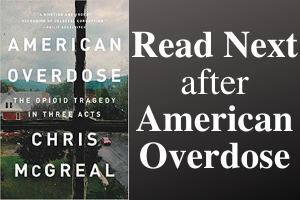
Two public health emergencies
The opioid epidemic was declared a public health emergency in 2017. Between 2017 and 2018, prescription-related opioid overdose deaths dropped 13.5 percent according to the CDC. Since then, the isolation, shutdowns, social distancing, and joblessness resulting from the 2020 Covid-19 pandemic have created new challenges. Support services had to re-imagine how to help people who previously could receive in-person rehabilitation care. Shorter clinic hours or a switch to online means less assistance in recovery.
Learn more about the current state of the opioid epidemic in the days of the Covid19 pandemic with an article written for the Guardian by Chris McGreal or an article written by Otillia Steadman for Buzzfeed News.
Interested in finding resources and information for people affected by opioid addiction?
Please visit https://readbetween.org/resources.
Read Between the Ravines
This spring, the Lake Forest Library highlighted a book on the opioid epidemic in an initiative called Read Between the Ravines, a two communities, one nonfiction book program that brings together Lake Forest and Lake Bluff with the purpose of enhancing nonfiction literacy and inspiring discussion around real-world issues. Both libraries planned events around this year’s book, American Overdose by Chris McGreal, most of which were cancelled due to the Spring 2020 Covid19 shutdown.
The interview with the author, however, was rescheduled for today, Tuesday, July 28 at 7 pm, and will be viewable on Facebook Live simultaneously on the Lake Forest Library, Gorton Community Center, and Lake Bluff Library Facebook pages. Mcgreal will be interviewed by Michael Nerheim, Lake County State’s Attorney. Topics will include the opioid epidemic, it’s handling, and the current state of the epidemic.
If you miss the live event, watch the recording afterward at facebook.com/pg/LakeForestLibrary/videos/.
Book Recommendations
If you are looking for more perspectives, angles, or viewpoints on the opioid crisis, its causes, and its handling, click on one of the titles below to find it at the Lake Forest Library.
Nonfiction works about the opioid epidemic
American Overdose by Chris McGreal
Published in 2018, American Overdose lays bare the corruption and greed that allowed the opioid epidemic to occur. McGreal details the actions of political figures, health professionals, and the pharmaceutical industry and the consequences these actions or in-actions have on the American public.
Originally published in 2003 with a second edition published in 2018, Meier follows many people mentioned in American Overdose, with a focus on the earlier stages of the epidemic.
Dopesick centers around the Appalachia region telling the stories of those affected while weaving in information about prescription practices and how the opioid epidemic has continued for over two decades.
American Epidemic edited by John McMillian
American Epidemic is a collection of pre-published essays and book excepts, edited by John McMillian, that paints a wide ranging picture of those the epidemic has harmed and the greed and in-action that allowed it to persist and profiles treatment options and Americans that have been harmed. Excepts include writing by Beth Macy, Rebecca Davis O’Brian, Sam Quinones, Margaret Talbot, and many others, between 2012 and 2018.
Dreamland was a National Book Critics Circle Award winner in 2015. The library copy is an updated 2018 edition with a new chapter added by Quinones to the end. Quinones weaves a compelling narrative that crisscrosses the county from Appalachia to the west coast to provide the reader with the historical and contemporary context necessary to understand how the use of opiates such as OxyContin and Heroin became a national epidemic with catastrophic consequences.
Hampton writes from the perspective of someone who has personally struggled with addiction. In American Fix, Hampton tells his story, covers challenges that people in recovery face and offers his plan to help America end the opioid epidemic. The front and back cover includes blurbs from politicians on both sides of the isle.
Fentanyl, Inc. by Ben Westhoff
The opioid epidemic has been considered to have three waves. The third wave started in 2013, and consisted of synthetic opioids, such as Fentanyl. Westhoff describes what Fentanyl is, the creation of the drug, and how it was hijacked and sold to people across continents.
In American Pain, Temple follows the rise and fall of a pill mill called American Pain in Florida and how it influenced what became the nation-wide opioid epidemic. Profiles the forces that brought down an organized crime ring and looks at a different location affected by the opioid epidemic than other books on this list.